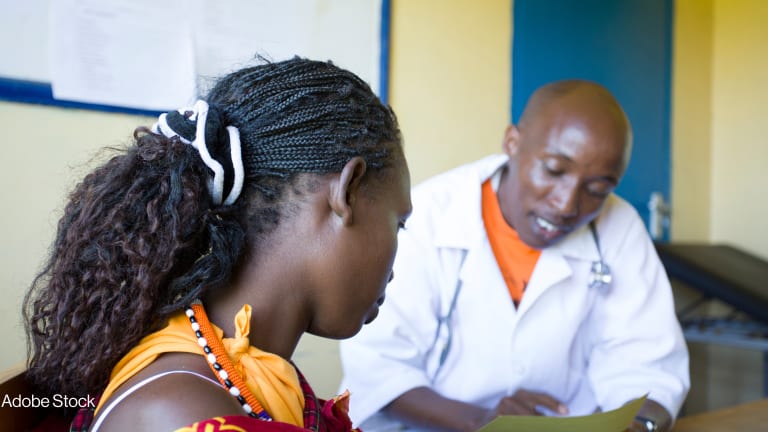
What in the world is “meHealth”?
It’s the combination of mHealth and e-health technologies and services to give personalized health support to anyone in the health system, whether patients, nurses, doctors, community health workers, administrations, or anywhere in between. In the simplest terms, meHealth is about communicating information within a health care system to improve desirable health outcomes.
Several groups throughout the world have launched meHealth pilots, projects and programs to improve HIV outcomes, but nowhere more so than in Africa, which has over 70 percent of the diagnosed HIV cases in the world. These meHealth interventions range greatly but include electronic patient databases, HIV testing reminders, medical data collection, partner status notifications, linkages to care, SMS-based laboratory results, treatment adherence alerts, appointment reminders, health education, PMTCT messaging, and health worker decision support.
As with any group of interventions tested on a diverse population in various environments, some show promise (for example two studies on how SMS reminders can improve HIV treatment outcomes) while others show that meHealth for HIV is in no way a panacea.
The logical question amid this research is: when meHealth interventions do work, what makes them work? The answer that seems easiest and least satisfying is, unfortunately, true: It depends.
The human level of meHealth
When you ask the leads of proven successful meHealth projects about their interventions, they will inevitably accompany their explanation of why it works with several caveats about what has not yet worked, or what they’re still unsure about. And sometimes even if an intervention has worked, often the exact opposite of that intervention has also worked somewhere else in a different situation.
See more stories on eliminating HIV:
► Harnessing the power of digital health to eliminate mother-to-child HIV transmission
► Investing in community health workers is essential for improving HIV health outcomes
► Where does the world stand in the fight against HIV and AIDS?
► How real numbers can eliminate mother-to-child transmission of HIV
Parsing through the results and unanswered questions reveals the complexity of meHealth interventions. meHealth enables personal devices to communicate information, but in the end it works at the human level, and humans are not as simple as technology. They are complex, dynamic, and always changing based on their contexts. meHealth cannot be everything to everyone at all times; what works in one population at one time will not necessarily work elsewhere.
Two projects I worked on in South Africa showed exactly how much customization in design matters — from the method of intervention (text, voice, interactive, passive, and so on) to the level of cultural accessibility (correct terminology, privacy, related stigma, and so on).
One project sent SMS communication to HIV-positive patients, including appointment reminders and weekly psycho-social treatment adherence text messages, while the other project sent SMS communications to pregnant women in the form of twice-weekly messages about maternal health and about preventing mother-to-child transmission of HIV. Both projects aimed to improve health outcomes of HIV-positive individuals, but the latter, focused on maternal health, had much higher uptake and more positive responses from users.
Our reflections on the two projects revealed that stigma may have been one of the key reasons the general HIV-positive project was less effective than the maternal health project. Within the HIV-positive population project, text messages focussed only on HIV-related topics, leading users to report that they were worried about keeping the text messages on their phone in fear that other people might see them.
The users of the maternal health project, however, did not have such worries.
First, the maternal health messages were offered to HIV-positive and negative recipients, though HIV-positive women received a different (but similar) set of messages that included the PMTCT messaging.
Secondly, the messages to HIV-positive pregnant women covered general maternal health topics in addition to PMTCT messages, meaning they were more diverse and interesting for the user and eased recipients’ hesitation to keep the messages on their phones because the PMTCT messaging was part of the standard maternal health messaging.
Both projects reached HIV-positive women, but early results showed that women who received PMTCT and maternal health messaging attended more antenatal care visits, were quicker to test their infants for HIV, were less likely to have had a caesarean section birth, and were less likely to have had a pre-term birth.
These nuanced differences between interventions may seem slight on paper, but research is now backing up how much these small tweaks can matter. For example, a study recently published in Biomed Central Public Health suggested that cultural appropriateness and adaption, integration with existing health systems, awareness of privacy sensitivities, improvement in work flow and minimal human resource needs are all aspects of a successful mHealth project.
What’s next in meHealth for HIV?
More and more, influencers in the field are viewing the dynamic human side of meHealth as not just a challenge but also an opportunity. One smartphone app intervention currently being tested in Johannesburg, for example, is providing HIV laboratory results, treatment support, and care information to newly diagnosed HIV-positive patients who have attended public health care facilities. The app is based on research that would have been impossible as recently as 18 months ago in any part of South Africa, simply because very few users of South Africa’s public health system had smartphones at that time, while roughly 85 percent of new phones sold in the past year have been smartphones.
There is much about meHealth that we do not yet understand — from knowing what is the right “dosage” of information via SMS to gauging how we can best support key populations with meHealth. If we are serious about reaching an AIDS-free generation, we should scale up interventions when we know they work, and continue to relentlessly pursue a deeper understanding of the different human contexts around interventions for which we still do not have answers.
To read additional content on global health, go to Focus On: Global Health in partnership with Johnson & Johnson.








